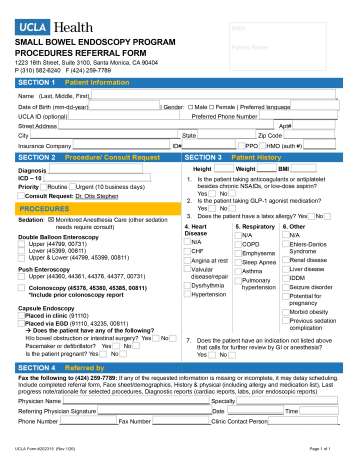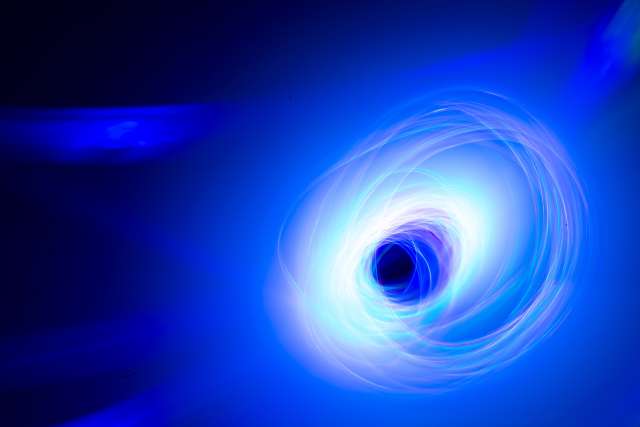Small Bowel Endoscopy Program
As a leading small bowel endoscopy program, we deliver timely and accurate diagnosis as well as comprehensive treatment.
Find Your Care
The UCLA digestive diseases team cares for routine and complex gastrointestinal problems. To learn more about our services, call 310-825-2631.
Why choose the UCLA Health Small Bowel Endoscopy Program?
The small bowel is the longest segment of the gastrointestinal (GI) tract. Although many GI diseases can affect the small bowel, diagnosis and treatment of these conditions can be challenging because it is much more difficult to access endoscopically than the upper intestine and colon. Our internationally recognized enteroscopist provides the most advanced approach to visualizing the small bowel to determine the cause of unexplained bleeding and other concerns affecting this part of the GI tract, with the ability to endoscopically treat the problem once it has been diagnosed. Highlights of our program include:

Nationally recognized expert in endoscopic therapy and imaging: Accessing the small bowel through endoscopy is a complex procedure requiring the most advanced technical skills. Our enteroscopist is an expert in reading capsule endoscopy studies and has extensive experience and expertise in all methods of device-assisted enteroscopy, especially double-balloon enteroscopy.
Advanced therapies and diagnostic tools: We use the latest technology, tools, and therapies to properly diagnose and treat patients — capsule endoscopy (PillCam™) and most notably double-balloon enteroscopy, which enables the visualization of the entire small bowel, improving diagnostic capabilities as well as the ability to treat. We are at the forefront of leading-edge therapies that improve GI health.
Collaborative care: Many patients with known GI conditions, such as Crohn’s disease, Celiac disease, and small bowel vascular lesions, or who have altered anatomy following complex surgery or transplantation, need treatment or close monitoring of potential complications that can develop in the small bowel. Our Small Bowel Endoscopy Program serves as a bridge to other programs at UCLA, working with gastroenterologists, hepatologists, oncologists, surgeons, and the bariatric team to assess patients with unexplained GI bleeding or abnormal findings, and to develop individualized care plans.
Advancing the field through research: Our research focuses on improving the diagnosis and treatment within the small intestine by investigating novel diagnostic techniques, developing therapeutic capabilities, and standardizing practice methods. We participate in both clinical trials and investigator-initiated research that helps define and advance the standard of care throughout the country.
Our areas of care
As a leading small bowel endoscopy program, we deliver timely and accurate diagnosis as well as comprehensive treatment.
Comprehensive evaluations: Our specialists diagnose small bowel disorders by gathering a thorough medical history and physical examination and reviewing your prior medical records and studies. As part of the evaluation, your physician may order additional testing. Our comprehensive assessments enable us to deliver the most effective therapies for you.
Advanced diagnostics and treatment: Capsule endoscopy is a safe, noninvasive method of evaluating the small bowel for signs of disease. You swallow a tiny camera that moves through your digestive tract and takes pictures over several hours. The images show inflammation (swelling), bleeding and other signs of disease. You safely pass the PillCam™ with your stool. Capsule endoscopy can identify sources of blood loss from the GI tract and tumors or polyps of the small bowel. It can also look for inflammatory conditions such as Crohn's disease.
Small bowel endoscopy is a safe and the most effective method for visualizing the entire small intestine in order to determine the root causes of small bowel disorders, such as unexplained bleeding, inflammation, polyps, or tumors. Having a scope that can go all the way through the small intestine not only allows the enteroscopist to see the problem, but it also facilitates effective treatment, including any findings from a capsule endoscopy study. Depending on the finding, the enteroscopist can either treat the disorder during the same procedure, biopsy potential tumors, or mark lesions to guide the surgeon.
Small bowel diseases
- Celiac disease
- Crohn’s disease
- Enteritis
- GI bleeding
- Gluten disorders
- Intestinal cancer
- Intestinal obstruction
- Peptic ulcer disease
- Short bowel syndrome
- Small intestinal bacterial overgrowth (SIBO)
Conditions we treat
A wide range of conditions can affect the small bowel. These include:
Anemia, in which the blood fails to produce enough healthy red blood cells, depriving the body’s tissues and organs of necessary levels of oxygen.
Angiodysplasia, an abnormality of blood vessels in the gut that is a common cause of unexplained GI bleeding and anemia.
Celiac disease, a chronic autoimmune digestive disorder in which ingesting gluten results in inflammation of the small bowel.
GI bleeding, commonly caused by abnormal blood vessels in the wall of the small bowel.
Inflammatory bowel disease, including Crohn’s disease and ulcerative colitis, in which chronic inflammation of the digestive tract can lead to symptoms that include abdominal pain, diarrhea, and blood in the stool.
Meckel diverticulum, a congenital anomaly of the small bowel that can lead to complications including bleeding, inflammation, and obstruction.
Mucosal disease, strictures, and both benign and malignant tumors.
Small bowel ischemia, characterized by partially or completely blocked blood flow to the small intestine.
Endoscopic diagnosis and treatment
Our expert team is among the most experienced in the nation at performing double-balloon enteroscopy, a highly technical procedure that makes it possible to visualize and treat small bowel disorders. This procedure utilizes an instrument consisting of a flexible tube with a camera that is guided by a longer outer tube with balloons that are alternately inflated and deflated to move the endoscope through the small intestine. Compared with other methods of accessing the small bowel, double-balloon enteroscopy has proved to be the safest and best way to visualize conditions within the small bowel.
Once the small bowel is accessed, the enteroscopist can perform a wide range of therapeutic interventions, including:
- Ablation of small bowel angiodysplasias
- Biopsy of abnormal small bowel lesions for pathology diagnosis
- Cauterization to stop bleeding
- Dilation (widening) of strictures that are causing obstruction in Crohn’s disease patients and others who experience chronic inflammation and scar tissue
- Evaluation and marking of tumors to provide better targets for surgeons through laparoscopic techniques
- Monitoring of Celiac disease patients and other patients at increased risk for small bowel cancers
- Removal of polyps and abnormal lesions
- Removal of foreign bodies in the small intestine, such as a retained capsule endoscopy (PillCam™)
Meet our team

Contact us
Call us at (310) 582-6240 to connect with a small bowel endoscopy expert.
For referring providers
Healthcare professionals should use the Small Bowel Endoscopy Program Procedures Referral Form to order clinic consults and procedures. The completed form should be faxed to (424) 259-7789. For help, you may also call our staff at (310) 582-6240.

